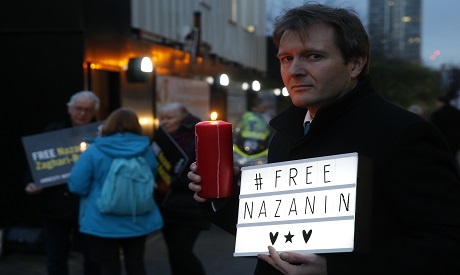
Richard Ratcliffe husband of imprisoned British-Iranian dual national Nazanin Zaghari-Ratcliffe, poses during an Amnesty International led vigil outside the Iranian Embassy in London. (AP)
Iran's state television, citing an unnamed official, announced Tuesday that a British-Iranian dual national is facing a new charge, raising fears she could be forced to return to prison following her temporary release.
The report did not elaborate beyond saying that Nazanin Zaghari-Ratcliffe appeared Tuesday morning before a branch of the country's Revolutionary Court in Tehran, where she was first sentenced to prison on murky espionage charges in 2017.
Calls to Zaghari-Ratcliffe's attorney and the court were not immediately returned.
The new indictment comes as Britain and Iran negotiate the release of some 400 million pounds ($530 million) held by London, a payment the late Iranian Shah Mohammad Reza Pahlavi made for Chieftain tanks that were never delivered. The shah abandoned the throne in 1979 and the Islamic Revolution soon installed the clerically overseen system that endures today.
Authorities in London and Tehran deny that Zaghari-Ratcliffe is linked to the repayment deal. But a prisoner exchange that freed four American citizens in 2016 saw the U.S. pay a similar sum to Iran the same day of their release.
Zaghari-Ratcliffe this spring was granted temporary release from prison due to the coronavirus pandemic after serving nearly all of her five-year sentence, raising hopes she would soon return home to Britain.
Iran has been hit hard by the virus, becoming the worst-affected country in the Middle East with more than 391,000 reported cases and 22,542 deaths. In the wake of the pandemic, Iran furloughed more than 100,000 inmates over fears of unchecked contagion in its crowded prisons.
Zaghari-Ratcliffe's case has stirred tensions between Iran and Britain, where on Tuesday her local lawmaker in London, Tulip Siddiq, confirmed that Zaghari-Ratcliffe had been taken to court and would face another trial Sunday in what she called ``an extremely worrying development.''
Siddiq urged British authorities to demand transparency from Iranian authorities and resolve ``the outstanding issues'' in Zaghari-Ratcliffe's case, including the long-running debt dispute.
Iran does not recognize dual nationalities, so detainees like Zaghari-Ratcliffe cannot receive consular assistance. A U.N. panel has described ``an emerging pattern involving the arbitrary deprivation of liberty of dual nationals'' in Iran, which Tehran denies.
Analysts and family members of dual nationals and others detained in Iran accuse hard-liners in the Islamic Republic's security agencies of using the prisoners as bargaining chips for money or influence in negotiations with the West.
Zaghari-Ratcliffe was scooped up at the Tehran airport when trying to return to Britain with her toddler daughter in April 2016.
Her family insists she had traveled to Iran to visit relatives, vigorously denying the charges that she was plotting the ``soft toppling'' of Iran's government. U.N. experts have decried her detention as ``arbitrary'' and expressed grave concern for her welfare when she was held in Tehran's Evin Prison prison.
At the time of her arrest, Zaghari-Ratcliffe worked for the Thomson Reuters Foundation, the charitable arm of the news agency.
Short link: